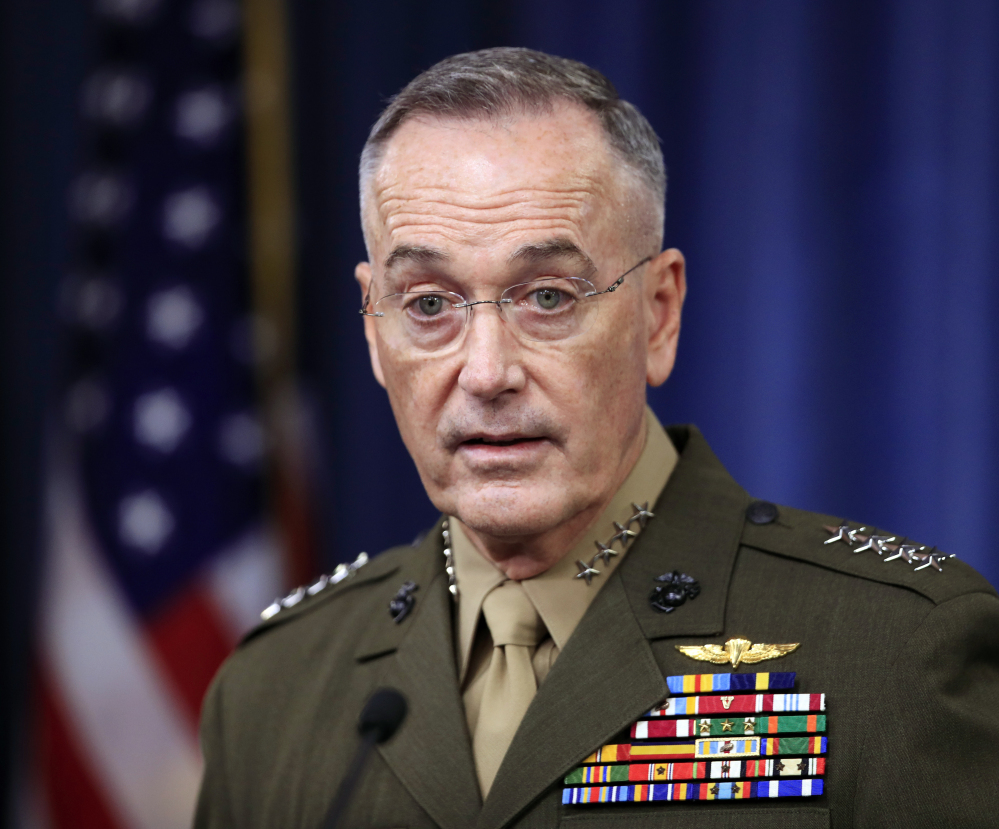WASHINGTON — The nation’s top general outlined the investigation Monday into the ambush that killed four U.S. servicemen in the African country of Niger on Oct. 4, and provided new details on the attack.
Gen. Joseph F. Dunford Jr., chairman of the Joint Chiefs of Staff, acknowledged that aspects of the attack are still unclear as well as the perception that the Pentagon has not been forthcoming on the deadliest combat incident since President Trump took office.
His comments came the same day that the widow of an Army sergeant killed in the attack publicly said Trump had “made me cry even worse” in a condolence phone call when, she said, he didn’t know her husband’s name.
“We owe the families as much information as we can find out about what happened, and we owe the American people an explanation of what their men and women were doing at this particular time,” Dunford told reporters at the Pentagon.
Sketching out the timeline of the attack, Dunford said a dozen U.S. soldiers and 30 Nigerian troops embarked Oct. 3 on a “reconnaissance mission” to the village of Tongo Tongo, near the border with Mali.
“The assessment by our leaders on the ground at that time was that contact with the enemy was unlikely,” he said.
The next morning, the soldiers were returning to their base when they were hit with machine gun fire and rocket-propelled grenades. One hour after taking fire, the Americans radioed a request for air support.
A reconnaissance drone appeared “within minutes,” Dunford said. An hour later, French Mirage fighter jets and helicopter gunships arrived on the scene, since the Pentagon does not have attack warplanes in the region.
During the firefight, two U.S. soldiers were wounded and evacuated by the French. Three U.S. soldiers were killed and were evacuated by a military contractor aircraft that night.
One other soldier, Sgt. La David Johnson, was still missing. His body wasn’t found until two days later.
“Now many of you have asked a number of questions, and many of them are fair questions, and we owe you more information,” Dunford said. “More importantly, we owe the families of the fallen more information, and that’s what the investigation is designed to identify.”
Dunford said the questions include: Did the mission of U.S. forces change during the operation? Did U.S. forces have adequate intelligence, equipment and training?
Was a pre-mission assessment of the threat accurate? How did U.S. forces become separated during the engagement and how did they lose contact with Sgt. Johnson? And why didn’t they take time to find and recover his body?
Dunford’s briefing came after Myesha Johnson, the sergeant’s widow, made her first public comments during an interview on ABC’s “Good Morning America.”
“I don’t know how he got killed, where he got killed or anything,” she said. “I don’t know that part. They never told me and that’s what I’ve been trying to find out since day one.”
Myesha Johnson said Trump’s call had upset her further: “I was very angry at the tone of his voice and how he couldn’t remember my husband’s name.”
Trump tweeted after the interview had aired: “I had a very respectful conversation with the widow of Sgt. La David Johnson, and spoke his name from beginning, without hesitation!”
Send questions/comments to the editors.




Comments are no longer available on this story